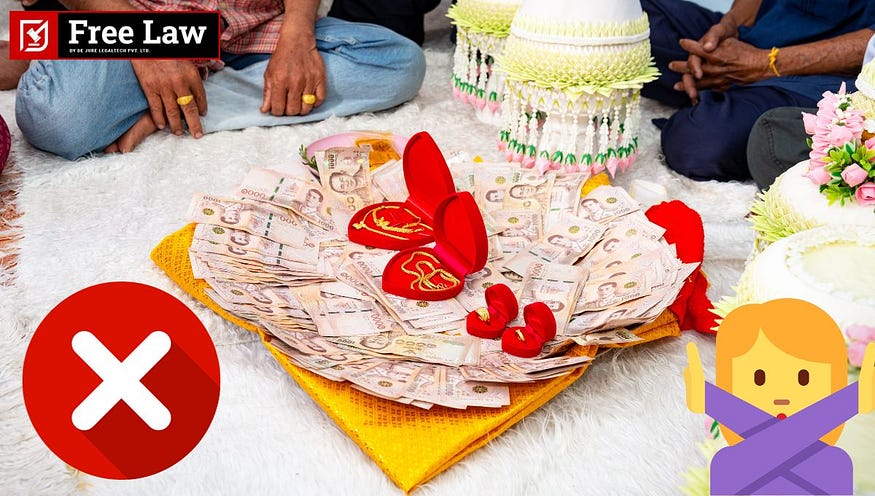Dowry Prohibition Laws

Introduction
In India, the dowry system has a long history that dates back centuries. It is a traditional practice in some cultures, including India, where the bride’s family provides gifts, money, or property to the groom or his family at the time of marriage. While hearing the S. Gopal Reddy vs. the State of A.P. case, Justice Dr. AS Anand held that “The curse of dowry has been raising its ugly head every now and then but the evil has been flourishing beyond imaginable proportions. It was to curb this evil, that led the Parliament to enact The Dowry Prohibition Act in 1961.” According to Section 2 of the Dowry Prohibition Act, ‘dowry’ means “any property or valuable security given or agreed to be given either directly or indirectly (a) by one party to a marriage to the other party to the marriage; or (b) by the parent of either party to a marriage or by any other person, to either party to the marriage or to any other person, at or before [or any time after the marriage] [in connection with the marriage of the said parties, but does not include] dower or mahr in the case of persons to whom the Muslim Personal Law (Shariat) applies.”
It is given as a form of financial support as mentioned in Section 6 of the Dowry Prohibition Act (Dowry to be for the benefit of the wife or her heirs) but can lead to social issues, exploitation, and gender-based violence. Some of the most common dowry crimes against Indian women include cruelty, abetment to suicide, domestic violence, dowry death, female foeticide, no education for girls, and fraud. According to Statista Research report on ‘reported dowry death cases in India from 2005 to 2021’ it has been observed that 6.8 thousand cases in India were reported regarding dowry death in 2021. The anxiously increasing number of dowry death cases has awakened the need for laws to prevent and prohibit them. This article provides a brief discussion of different laws related to Dowry in India and punishment as per the law for those who accept, demand, or give dowry.
Laws related to Dowry in India
There are several laws in India that aim to prohibit and combat the dowry system, which is a social issue prevalent in some parts of the country. Here are some key legislations related to dowry:
The Dowry Prohibition Act, 1961
The Act was enacted on May 20, 1961, in order to ‘prohibit the giving or taking of dowry’. It is applicable to the whole world except the State of Jammu and Kashmir. This is the primary legislation that makes the giving or taking or demanding of dowry, directly or indirectly, illegal. The act also penalizes anyone who abets or aids in the giving or taking of dowry. Section 3 of the Act illustrates the penalty for giving or taking dowry, it states “If any person, after the commencement of this Act, gives or takes or abets the giving or taking of dowry, he shall be punishable with imprisonment for a term which shall not be less than five years and with fine which shall not be less than fifteen thousand rupees, or the amount of the value of such dowry whichever is more…” Not only this, any individual who demands dowry is also punishable under the provisions of this Act. According to Section 4 of the Dowry Prohibition Act, “If any person, demands, directly or indirectly, from the parents or other relatives or guardian of a bride or bridegroom, as the case may be, any dowry, he shall be punishable with imprisonment which may extend to two years and with fine which may extend to ten thousand rupees…” This means that either of the parties demanding dowry is penalized.
Along with this, Section 4A of the Act penalizes the one who offers any property or money as consideration for the marriage of his son, daughter, or any other relative via advertisements. The one who does the same is punished with imprisonment not less than six months but which may extend to five years or a fine extending to 15,000 rupees. Any agreement related to the give or take of dowry is addressed as void as per Section 5 of the Dowry Prohibition Act. In addition to this, Section 7 of the Act defines ‘Cognizance of offences’ where “no Court inferior to that of a Metropolitan Magistrate or a Judicial Magistrate of the first class shall try any offence under this Act.” Also, the cognizance of an offence should be taken by the Court only when the report is mentioned by the victim, the parents, or any other relative of the victim. Moreover, the punishments mentioned in Sections 3 and 4 of the Act are made hasher with Section 8 of the Dowry Prohibition Act which makes the offence cognizable and non-bailable. As per Section 8A, “Where any person is prosecuted for taking or abetting the taking of any dowry under Section 3, or the demanding of dowry under Section 4, the burden of proving that he had not committed an offence under those sections shall be on him.”
Click Here To Read The Full Article
Read More: Legal Articles
Also Read: Supreme Court Latest Updates, Legal News
Explore Supreme Court Judgments for Free
Comments
Post a Comment